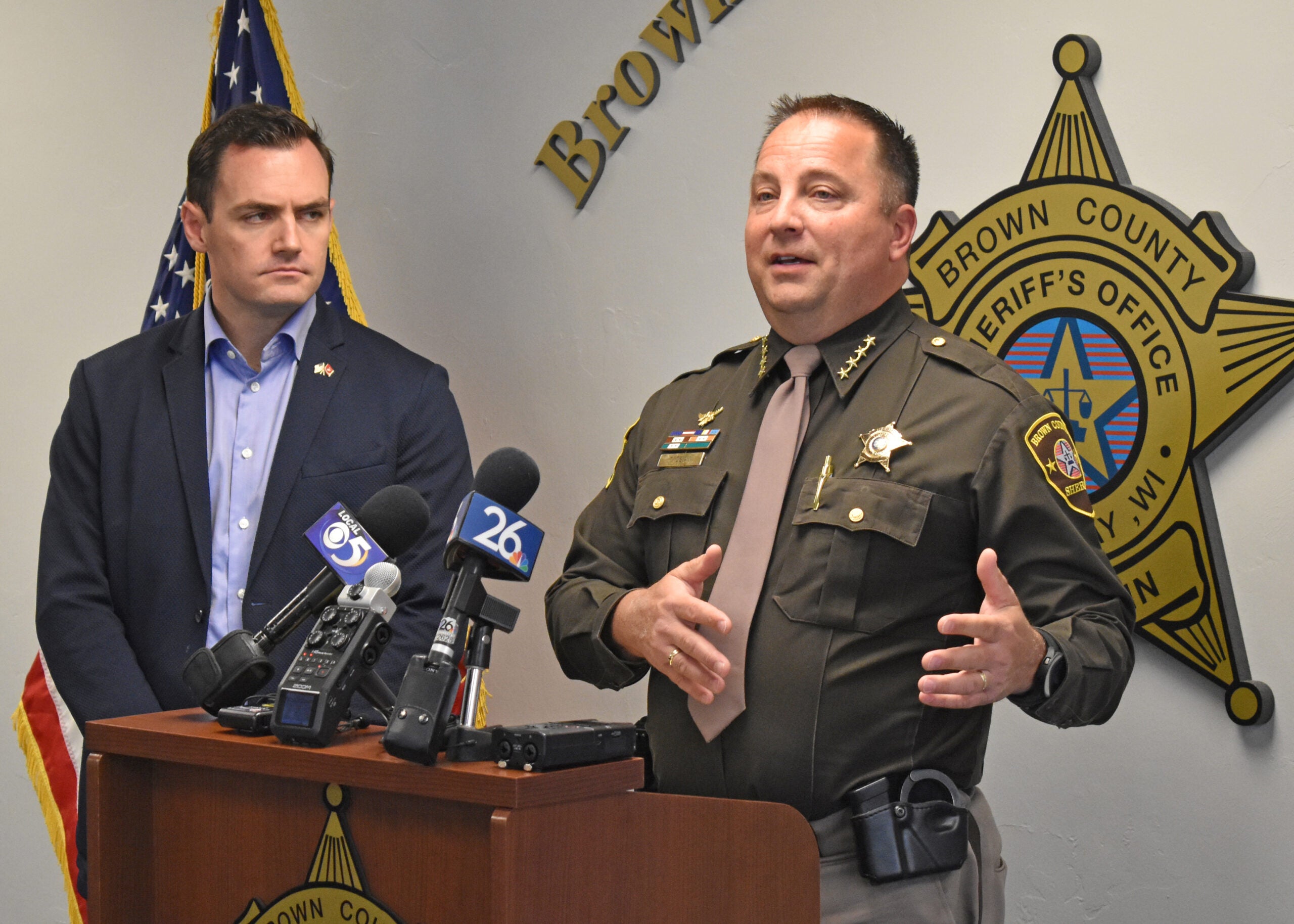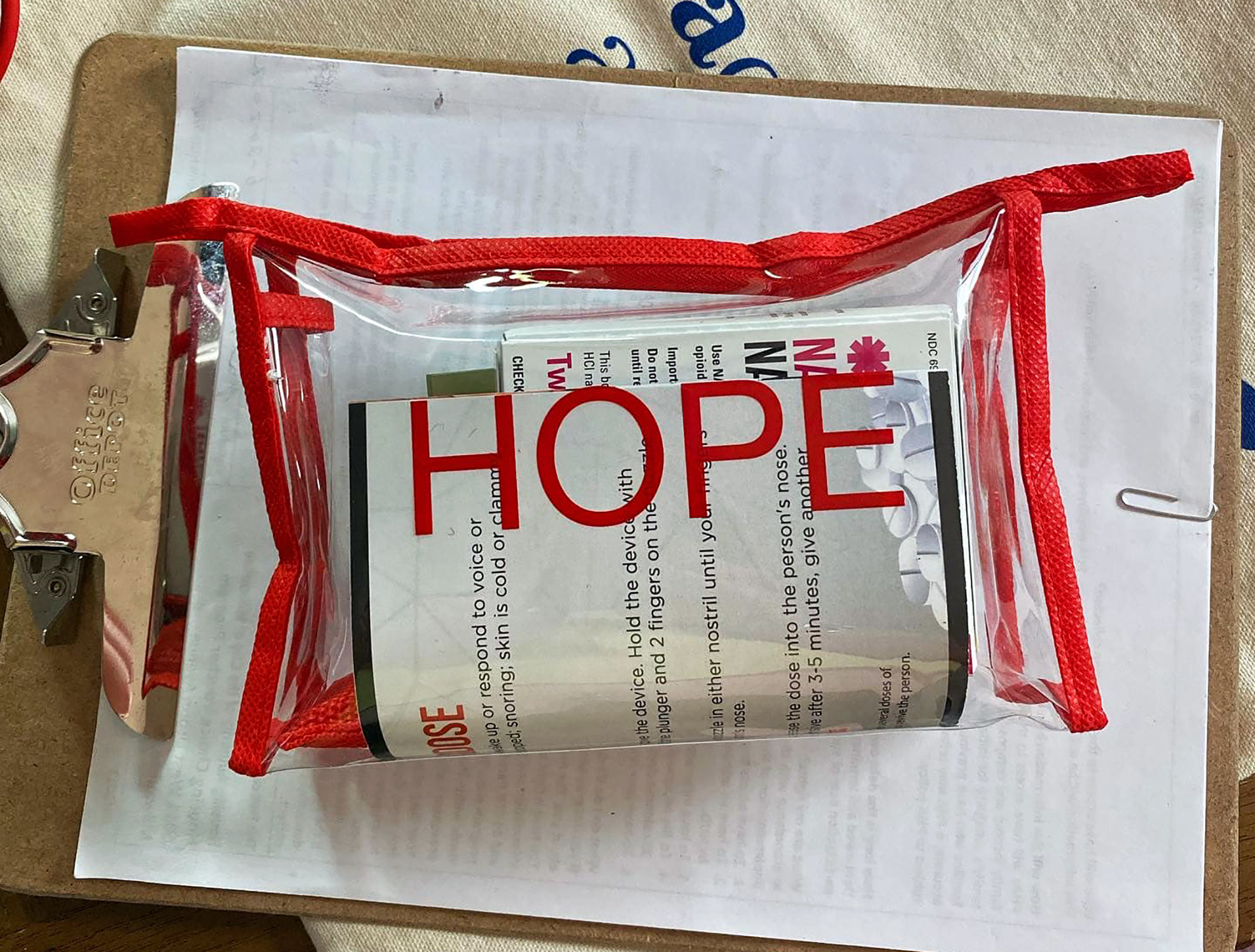The Brown County Sheriff’s Office and a local congressman hope more collaboration with the United States Postal Service can help address rising fentanyl risk in northeast Wisconsin.
Last year, the Brown County Drug Task Force seized nearly 10,000 grams of fentanyl — a deadly, synthetic opioid. For comparison, the task force seized roughly 1,100 grams in 2021.
That’s according to Brown County Sheriff Todd Delain, who held a press conference Monday with Republican U.S. Rep. Mike Gallagher.
News with a little more humanity
WPR’s “Wisconsin Today” newsletter keeps you connected to the state you love without feeling overwhelmed. No paywall. No agenda. No corporate filter.
“We’re seeing fentanyl as the No. 1 issue facing northeast Wisconsin as far as a drug,” Delain said. “Right now, we’re seeing fentanyl at the same or higher level than we have in 2022.”
Outside Brown County, fentanyl has also become a growing issue for the Fox Valley, where the Lake Winnebago Area Metropolitan Enforcement Group-Drug Unit saw a 4,400 percent increase in the amount of fentanyl seized from 2021 to 2022.
And state health officials reported a record 1,427 opioid overdose deaths in 2021, according to the most recent data available. Synthetic opioids, like fentanyl, were identified in 91 percent of those opioid deaths, the Wisconsin Department of Health Services said. Statewide overdose data for 2022 won’t be finalized until this fall.
Delain said approximately 60 percent of the Brown County Drug Task Force’s fentanyl seizures last year were related to distribution through USPS. In January, someone even mailed fentanyl and cocaine to the Green Bay police chief through USPS.
Prior to the rise in fentanyl, methamphetamines plagued the area, Delain said. A Green Bay man was sentenced in March for distributing more than 13 kilograms of methamphetamine, after mailing drugs from California to Wisconsin through USPS.
To address the issue, Gallagher and Delain are sending a letter to USPS requesting a Postal Service Task Force officer for Brown County. The officer would be a deputy of the Brown County Sheriff’s Office but would also be deputized by USPS, giving them better access to postal records.
Currently, Gallagher said if USPS identifies a package containing fentanyl or opioids, the post office typically disposes of it, unless it’s a “massive shipment.” While that keeps some drugs out of the community, Gallagher said he believes it isn’t proactive enough.
“Creating a task force officer fixes this by deputizing someone from the Brown County Sheriff’s Department to work with the United States Postal Service on any opioid case, which would then enhance communication and ensure that we leave no stone unturned in going after the people who are shipping fentanyl into our community,” Gallagher said.
Delain said the sheriff’s office has an “incredible relationship” with USPS, and the two have worked together in the past. But he said the task force officer would allow his department to better follow up on drug package shipments and speed up investigations.
“We have an opportunity to do more,” he said. “I understand that it would be a little bit more work for them as well because, ultimately, it requires oversight by them. A deputy position for us means that somebody that’s a supervisor with them is going to ensure that we’re properly trained on all their procedures, that we understand their records and that we’re following the standards that they’ve set for postal records.”
The sheriff also said the move wouldn’t be unprecedented. Brown County already has an officer deputized by the FBI who works on Internet Crimes Against Children, another deputized by the Drug Enforcement Administration to work on narcotics investigations and a third deputized by the U.S. Marshals Service to assist in fugitive apprehension.
Gallagher added that Wisconsin already has two Postal Service Task Force officers in the Madison and Milwaukee areas, respectively.
“Being hours away, and with limited knowledge of northeast Wisconsin, these officers can’t provide the assistance that we need in northeast Wisconsin,” he said. “That’s why we need our own task force officer in Green Bay.”
Gallagher said he’s hoping for a quick response from USPS, and welcomes an open dialogue about the logistics.
“This is not something that can be ignored,” Gallagher said. “The sheriff and I are going to be working together to apply some productive pressure to the Postal Service.”
In a statement, Francis Pilon, team leader for the U.S. Postal Inspection Service’s Milwaukee Domicile, said the Postal Inspection Service employs federal law enforcement agents who investigate postal-related crimes, and that investigating narcotics shipments is a “top priority.”
“Leadership from the Inspection Service’s Chicago Division met with Sheriff Delain in March of 2022 to discuss his and Congressman Gallagher’s concern about narcotics trafficked through the US Mail to the Brown County Area,” he said. “The Inspection Service will continue to evaluate and allocate resources to best support the state of Wisconsin in partnership with our federal, state and local law enforcement counterparts.”
Wisconsin Public Radio, © Copyright 2026, Board of Regents of the University of Wisconsin System and Wisconsin Educational Communications Board.






